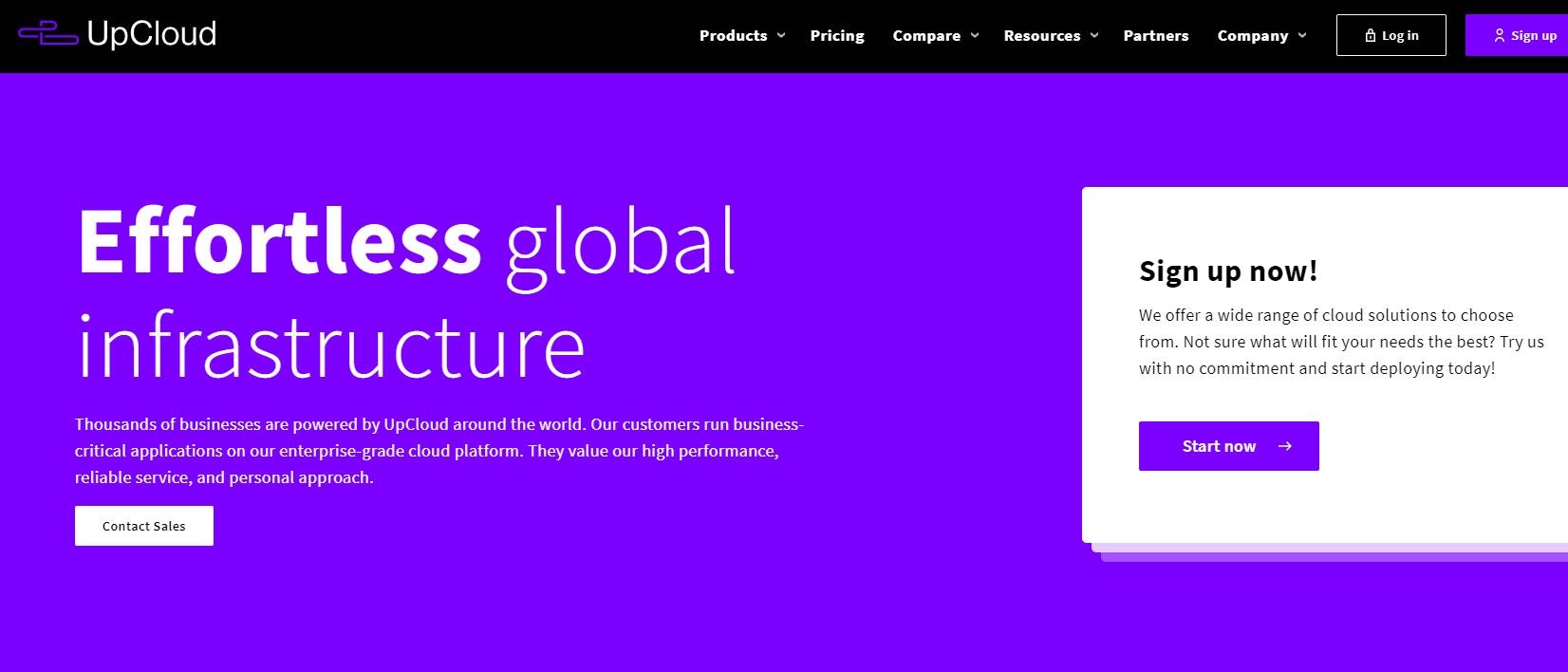TechRadar Verdict
UpCloud is a Finland-based web hosting provider and a very good choice for those who want to launch their site on the cloud. Even though UpCloud is not the most beginner-friendly host out there, it provides enough easy-to-follow tutorials and 24/7 support staff to get you started.
Pros
- +
24/7 customer support
- +
Swift server deployment
- +
Decent network of data centers
- +
Fairly priced and flexible hosting solutions
- +
Thorough tutorials and detailed documentation
- +
Responsive, resourceful and friendly support staff
Cons
- -
Not particularly novice-friendly
- -
No option for one-click installs
- -
No shared hosting
Why you can trust TechRadar
Formed in 2012, UpCloud is European cloud service provider offering a lightning fast and reliable cloud platform backed by an incredible 100% uptime SLA. The company is headquartered in Helsinki (Finland) and manages and maintains a network of twelve data centers across the globe. This network includes Amsterdam (the Netherlands), Frankfurt (Germany), London (the UK), Madrid (Spain), San Jose (the USA), New York (the USA), Chicago (the USA), Warsaw (Poland) and (naturally) Helsinki.
In their words, UpCloud strives to provide suitable and scalable cloud hosting solutions for business-critical websites at competitive prices. Their key audience are entrepreneurs and small to medium-sized enterprises working in managed hosting, IT services, ecommerce, SaaS, and PaaS. Cloud Spectator (a consulting company focused on the cloud computing industry) recognized them twice (so far) as the number one provider in terms of performance, and included them in the top 10 cloud hosting providers in Europe.
- Interested in UpCloud? Check out the website here
UpCloud’s main site takes advantage of clear-cut design, familiar layout and simple color scheme with one dominant color on every page, which simplifies navigation even further. It is currently available in English language exclusively.
Their official blog matches up with the site in terms of visuals and overall design, and (most importantly) is updated on a regular basis. The same is true for their presence on social networking sites including Facebook, Twitter, GitHub, Instagram and LinkedIn, but excluding YouTube since it contains just a pair of videos uploaded a year ago.
- Also check out our roundup of the best cloud hosting
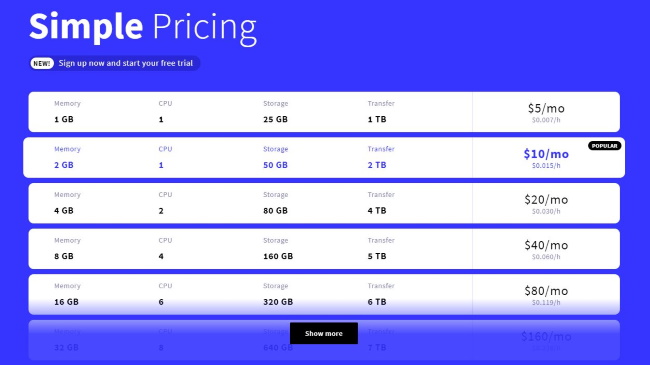
Plans and pricing
If there is a notion that cloud hosting can be a bit pricey, UpCloud is there to challenge it with its cheap and cheerful cloud-based goods. With UpCloud one is able to deploy a server for as little as $5.00 per month and the plan will include 1GB of memory, 1 CPU, 25GB of storage space and 1TB of data transfer, making them cheaper than many shared hosting packages offered by other providers.
With UpCloud you are free to choose between two pricing structures: a simple one, which includes ten different-sized plans, including the $5.00 one; and a flexible one, with which you can choose a plan and select the exact resources you want to include. There is also an option to purchase a simple-to-use private cloud or combine it with a public one to create a hybrid cloud solution and get the best of both worlds.
If you are not sure what to opt for, UpCloud provides a 3-day free trial for its first-time users. This trial will get you free access to a simple $5.00 Linux-based cloud server which we mentioned above. If you do decide to sign up, UPCloud offers a 30-day money back guarantee from the first payment.
Sign up to the TechRadar Pro newsletter to get all the top news, opinion, features and guidance your business needs to succeed!
All plans can be purchased via credit cards (Visa and MasterCard), PayPal and bank transfer (Finland only).
| Yes | No | Header Cell - Column 2 | Header Cell - Column 3 |
|---|---|---|---|
| VPS hosting | Free hosting | Row 0 - Cell 2 | Row 0 - Cell 3 |
| Linux hosting | Reseller hosting | Row 1 - Cell 2 | Row 1 - Cell 3 |
| E-commerce hosting | Video hosting | Row 2 - Cell 2 | Row 2 - Cell 3 |
| Windows hosting | Colocation hosting | Row 3 - Cell 2 | Row 3 - Cell 3 |
| Small business hosting | Bare metal hosting | Row 4 - Cell 2 | Row 4 - Cell 3 |
| WordPress hosting | Email hosting | Row 5 - Cell 2 | Row 5 - Cell 3 |
| Row 6 - Cell 0 | Green hosting | Row 6 - Cell 2 | Row 6 - Cell 3 |
| Row 7 - Cell 0 | Managed WordPress Hosting | Row 7 - Cell 2 | Row 7 - Cell 3 |
| Row 8 - Cell 0 | Shared hosting | Row 8 - Cell 2 | Row 8 - Cell 3 |
| Row 9 - Cell 0 | Dedicated hosting | Row 9 - Cell 2 | Row 9 - Cell 3 |
| Row 10 - Cell 0 | Website builder | Row 10 - Cell 2 | Row 10 - Cell 3 |
Ease of use
To get the thing going with UpCloud you’ll have to sign up and start your free trial. To do so, you’ll be required to provide account and billing information by surrendering your full name, username, e-mail address, phone number, street address, city, country, postal code and so on and so forth. You’ll also have to convince them you’re not a robot (even if you are) and preferably go through terms of service and privacy policy.
After your account is activated, you’ll be able enter UpCloud’s server section and deploy your first server. Here you’ll have to select a server location and there should be twelve available (mostly in the USA and Europe), so pick the closest one. Then you’ll get to choose what kind of plan you want to purchase (simple or flexible one), what operating system you want to use on that server, whether to include IPv6 support or initiate scripts, change a hostname, or add a brief description of your server.
After you click on “deploy” you’ll see a tiny yellow dot signifying that the process is still under way. When it turns green, it has been completed and you’ll get a password via email in a matter of seconds if you selected "Send password via email" during deployment.
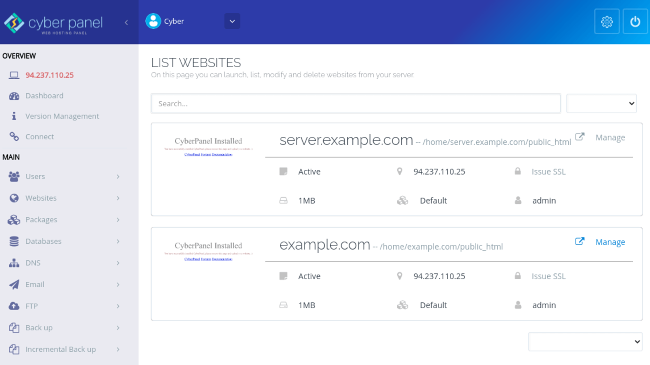
Although UpCloud provides a customized control panel, it is overly simplistic and will only help you with managing your server and giving you control over the billing. When you enter the console, if you are a rookie, here is where you might start getting into trouble, since there are no one-click installs nor likewise little luxuries. For instance, if you want to install WordPress, you’ll have to use this command-line interface (or console) to do so. Therefore, it is rather fortunate that UpCloud provides a great deal of guides and support staff that is available at all times and more than willing to back you up.
Even though UpCloud doesn’t provide any of the industry-standard control panels, if you want to use cPanel (of course you do), ClusterCS, CyberPanel, ServerPilot or any other, you are free to install it all by yourself.
As for backups, UpCloud provides periodic backups and an opportunity for you to do a full snapshot and also restore everything on your servers straight away.
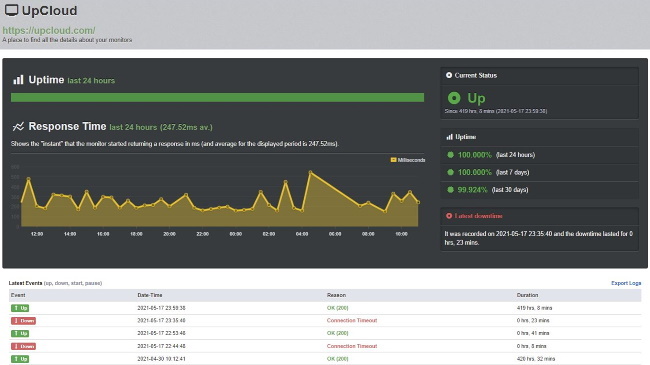
Speed and experience
UpCloud claims their scalable MaxIOPS block storage provides twice as fast and twice as reliable performance in comparison with industry-standard SSD cloud servers. However, after putting speed performance of UpCloud’s mail website under a magnifying glass (held by GTmetrix), we were faced with rather underwhelming results. The time it took to fully load the site was 6.8 seconds and despite the fact that it is better than the average of 8.1, the desirable result should be less than 3.5. Likewise, most of the vital web metrics were around the average resulting in an average result of C (71%).
On the subject of uptime, UpCloud asserts they have eliminated any risks by building UpCloud with an N+1 philosophy throughout their infrastructure. They also provide 100 % uptime SLA and a 50x payback for any downtime exceeding 5 minutes, all of which sounds pretty promising.
After monitoring the uptime of UpCloud’s main site (via UptimeRobot) for a period of one month we registered two instances of downtime and neither of them lasted longer than an hour, resulting in a total uptime of 99.92%. In other words, we were entitled to some sweet payback for all the downtime our poor website had suffered.
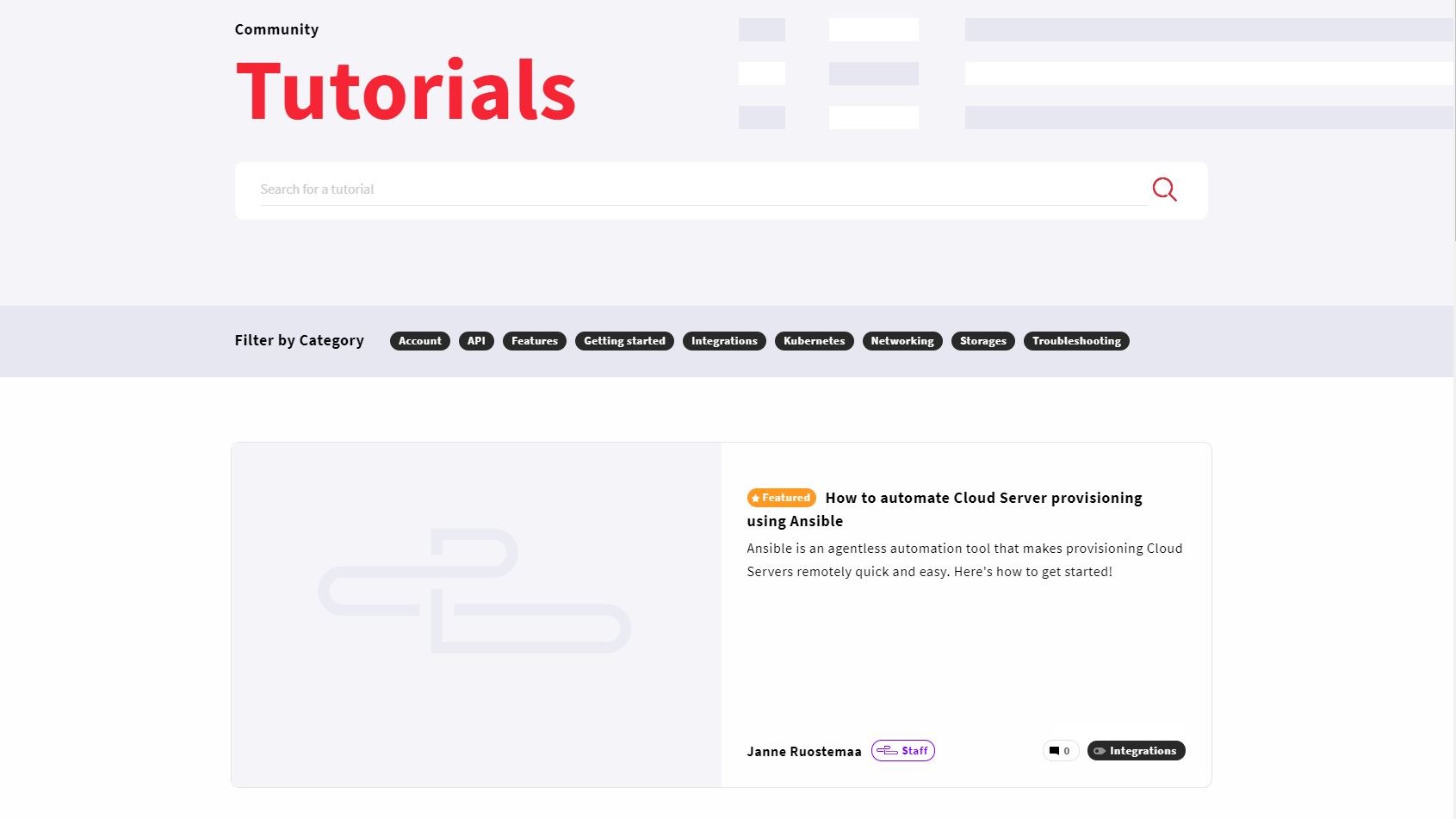
Support
All those who want to stay as self-sufficient as possible will feel right at home with UpCloud, since they provide a plenitude of self-help options. These include in-depth tutorials covering a variety of topics, a resource and API (application programming interface) documentation section where you can read all about their services and an exhaustive FAQ section.
Contributing to UpCloud’s online community can be rewarding in a literal sense, since one could be rewarded with account credits, which is a nice touch.
In addition to this, if you would like to reach out to UpCloud's support team, you can do so via live chat, email or telephone. All of them should be available round-the-clock and the average response time for live chat should be under two minutes. However, in our own experience it tends to be even less than that and the professional we got in touch with was very respectful, resourceful and had replied to all of our questions right away.
The competition
Like Finland-based UpCloud, US-based Vultr provides high-performance SSD cloud servers that cover a global network of data centers. These hosts are rather similar in terms of features and pricing, however, Vultr throws in dedicated cloud and bare metal server solutions for good measure, which might be decisive for some users.
DigitalOcean is another similar (and strong) competitor of UpCloud and the one that flaunts its made-in-USA credentials. Neither of them are particularly beginner-friendly, however, since UpCloud provides superior customer support, if you consider yourself a novice, give them a higher priority.
With all this said, if this was going to be your first professional website, you will do yourself a favor by considering some simpler small business hosting types such as shared hosting or either managed or unmanaged WordPress hosting.
Similar options will be found on offer with hosts such as HostGator, DreamHost or Bluehost, together with a wide array of novice-friendly features (affordable pricing, free domain, monthly billing, money-back guarantee, 24/7 support, 1-click installer and so forth).
In addition to this, all three of them provide access to easy-to-use website builders, which means you can build your own professional website without any experience in web design or anything similar.
Final verdict
Much like many of its fellow cloud hosting providers, UpCloud doesn’t try too hard to boost the confidence of less-skilled users by supplying them with all the bells and whistles they can ask for. Quite the opposite, for the most part they are left to fend for themselves and learn the ropes through trial and error. However, its powerful performance, solid security, swift customer service and an excellent value for money are sure to make it worthwhile for the majority of users.
If you are looking for a host with an emphasis on beginner-friendliness or the one that can provide a wider variety of hosting options overall, pay a visit to HostGator and Bluehost before making up your mind.
- We've also featured the best web hosting
Mirza Bahic is a freelance tech journalist and blogger from Sarajevo, Bosnia and Herzegovina. For the past four years, Mirza has been ghostwriting for a number of tech start-ups from various industries, including cloud, retail and B2B technology.
